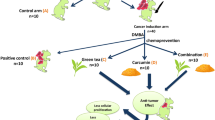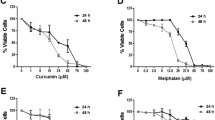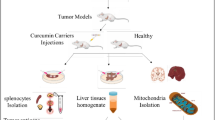Abstract
Aim:
To investigate the effects of curcumin on proliferation and apoptosis in testicular cancer cells in vitro and to investigate its molecular mechanisms of action.
Methods:
NTera-2 human malignant testicular germ cell line and F9 mouse teratocarcinoma stem cell line were used. The anti-proliferative effect was examined using MTT and colony formation assays. Hoechst 33258 staining, TUNEL and Annexin V-FITC/PI staining assays were used to analyze cell apoptosis. Protein expression was examined with Western blot analysis and immunocytochemical staining.
Results:
Curcumin (5, 10 and 15 μmol/L) inhibited the viability of NTera-2 cells in dose- and time-dependent manners. Curcumin significantly inhibited the colony formation in both NTera-2 and F9 cells. Curcumin dose-dependently induced apoptosis of NTera-2 cells by reducing FasL expression and Bcl-2-to-Bax ratio, and activating caspase-9, -8 and -3. Furthermore, curcumin dose-dependently reduced the expression of AP transcription factor AP-2γ in NTera-2 cells, whereas the pretreatment with the proteasome inhibitor MG132 blocked both the curcumin-induced reduction of AP-2γ and antiproliferative effect. Curcumin inhibited ErbB2 expression, and decreased the phosphorylation of Akt and ERK in NTera-2 cells.
Conclusion:
Curcumin induces apoptosis and inhibits proliferation in NTera-2 cells via the inhibition of AP-2γ-mediated downstream cell survival signaling pathways.
Similar content being viewed by others
Log in or create a free account to read this content
Gain free access to this article, as well as selected content from this journal and more on nature.com
or
References
Iczkowski KA, Butler SL . New immunohistochemical markers in testicular tumors. Anal Quant Cytol Histol 2006; 28: 181–7.
Holzik MF, Sijmons RH, Josette EHM, Hoekstra-Weebers, Sleijfer DT, Hoekstra HJ . Clinical and genetic aspects of testicular germ cell tumours. Hereditary Cancer Clin Practice 2008; 6: 3–14.
Aggarwal BB, Kumar A, Aggarwal MS, Shishodia S . Curcumin derived from turmeric (Curcuma longa): a spice for all seasons. Phytopharm Cancer Chemopreven 2005; 349–87.
Anand P, Sundaram C, Jhurani S, Kunnumakkara AB, Aggarwal BB . Curcumin and cancer: an “old-age” disease with an “age-old"”solution. Cancer Lett 2008; 267: 133–64.
Kunnumakkara AB, Anand P, Aggarwal BB . Curcumin inhibits proliferation, invasion, angiogenesis and metastasis of different cancers through interaction with multiple cell signaling proteins. Cancer Lett 2008; 269: 199–225.
Hartojo W, Silvers AL, Thomas DG, Seder CW, Lin L, Rao H, et al. Curcumin promotes apoptosis, increases chemosensitivity, and inhibits nuclear factor kappaB in esophageal adenocarcinoma. Transl Oncol 2010; 3: 99–108.
Subramaniam D, Ponnurangam S, Ramamoorthy P, Standing D, Battafarano RJ, Anant S, et al. Curcumin induces cell death in esophageal cancer cells through modulating Notch signaling. PLoS One 2012; 7: e30590.
Ravindran J, Prasad S, Aggarwal BB . Curcumin and cancer cells: how many ways can curry kill tumor cells selectively? AAPS J 2009; 11: 495510.
Shakibaei M, John T, Schulze-Tanzil G, Lehmann I, Mobasheri A . Suppression of NF-kappaB activation by curcumin leads to inhibition of expression of cyclo-oxygenase-2 and matrix metalloproteinase-9 in human articular chondrocytes: Implications for the treatment of osteoarthritis. Biochem Pharmacol 2007; 3: 1434–45.
Csaki C, Mobasheri A, Shakibaei M . Synergistic chondroprotective effects of curcumin and resveratrol in human articular chondrocytes: inhibition of IL-1beta-induced NF-kappaB-mediated inflammation and apoptosis. Arthritis Res Ther 2009; 11: R165.
Werling U, Schorle H . Transcription factor gene AP-2γ essential for early murine development. Mol Cell Biol 2002; 22: 3149–56.
Hoei-Hansen CE, Nielsen JE, Almstrup K, Sonne SB, Graem N, Skakkebaek NE, et al. Transcription factor AP-2gamma is a developmentally regulated marker of testicular carcinoma in situ and germ cell tumors. Clin Cancer Res 2004; 10: 8521–30.
Anttila MA, Kellokoski JK, Moisio KI, Mitchell PJ, Saarikoski S, Syrjänen K, et al. Expression of transcription factor AP-2alpha predicts survival in epithelial ovarian cancer. Br J Cancer 2000; 82: 1974–83.
Provenzano MJ, Yu L, Hitchler MJ, Fitzgerald MP, Robinson RA, Wayne S, et al. AP-2 participates in the transcriptional control of the amyloid precursor protein (APP) gene in oral squamous cell carcinoma. Exp Mol Pathol 2007; 83: 277–82.
Ailan H, Xiangwen X, Daolong R, Lu G, Xiaofeng D, Xi Q, et al. Identification of target genes of transcription factor activator protein 2 gamma in breast cancer cells. BMC Cancer 2009; 9: 279
Jäger R, Werling U, Rimpf S, Jacob A, Schorle H . Transcription factor AP-2gamma stimulates proliferation and apoptosis and impairs differentiation in a transgenic model. Mol Cancer Res 2003; 1: 921–9.
Li H, Goswami PC, Domann FE . AP-2γ Induces p21 expression, arrests cell cycle, and inhibits the tumor growth of human carcinoma cells. Neoplasia 2006; 8: 568–77.
Hoei-Hansen CE, Carlsen E, Jorgensen N, Leffers H, Skakkebaek NE, Rajpert-De Meyts E . Towards a non-invasive method for early detection of testicular neoplasia in semen samples by identification of fetal germ cell-specific markers. Hum Reprod 2007; 22: 167–73.
Xiang S, Sun Z, He Q, Yan F, Wang Y, Zhang J . Aspirin inhibits ErbB2 to induce apoptosis in cervical cancer cells. Med Oncol 2010; 27: 379–87.
Droga-Mazovec G, Bojic L, Petelin A, Ivanova S, Romih R, Repnik U, et al. Cysteine cathepsins trigger caspase-dependent cell death through cleavage of bid and antiapoptotic Bcl-2 homologues. J Biol Chem 2008; 283: 19140–50.
Wagner EF, Nebreda AR . Signal integration by JNK and p38 MAPK pathways in cancer development. Nat Rev Cancer 2009; 9: 537–49.
Nautiyal J, Banerjee S, Kanwar SS, Yu Y, Patel BB, Sarkar FH, et al. Curcumin enhances dasatinib-induced inhibition of growth and transformation of colon cancer cells. Int J Cancer 2011; 128: 951–61.
Heath-Engel HM, Chang NC, Shore GC . The endoplasmic reticulum in apoptosis and autophagy: role of the BCL-2 protein family. Oncogene 2008; 27: 6419–33.
Yun SI, Yoon HY, Chung YS . Glycogen synthase kinase-3beta regulates etoposide-induced apoptosis via Bcl-2 mediated caspase-3 activation in C3H10T1/2 cells. Apoptosis 2009; 14: 771–7.
Droga-Mazovec G, Bojic L, Petelin A, Ivanova S, Romih R, Repnik U, et al. Cysteine cathepsins trigger caspase-dependent cell death through cleavage of bid and antiapoptotic Bcl-2 homologues. J Biol Chem 2008; 283: 19140–50.
Milacic V, Banerjee S, Landis-Piwowar KR, Sarkar FH, Majumdar AP, Dou QP . Curcumin inhibits the proteasome activity in human colon cancer cells in vitro and in vivo. Cancer Res 2008; 68: 7283–92.
Fossey SL, Bear MD, Lin J, Li C, Schwartz EB, Li PK, et al. The novel curcumin analog FLLL32 decreases STAT3 DNA binding activity and expression, and induces apoptosis in osteosarcoma cell lines. BMC Cancer 2011; 11: 112.
Hsin IL, Sheu GT, Chen HH, Chiu LY, Wang HD, Chan HW, et al. N-acetyl cysteine mitigates curcumin-mediated telomerase inhibition through rescuing of Sp1 reduction in A549 cells. Mutat Res 2010; 688: 72–7.
Aggarwal BB, Banerjee S, Bharadwaj U, Sung B, Shishodia S, Sethi G . Curcumin induces the degradation of cyclin E expression through ubiquitin-dependent pathway and up-regulates cyclin-dependent kinase inhibitors p21 and p27 in multiple human tumor cell lines. Biochem Pharmacol 2007; 73: 1024–32.
Woodfield GW, Chen Y, Bair TB, Domann FE, Weigel RJ . Identification of primary gene targets of TFAP2C in hormone responsive breast carcinoma cells. Genes Chromosomes Cancer 2010; 49: 948–62.
Tari AM, Lopez-Berestein G . Serum predominantly activates MAPK and akt kinases in EGFR- and ErbB2-over-expressing cells, respectively. Int J Cancer 2000; 86: 295–7.
Yarden Y, Sliwkowski MX . Untangling the ErbB signalling network. Nat Rev Mol Cell Biol 2001; 2: 127–37.
Acknowledgements
This work was supported by the National Natural Science Foundation of China (Grant Nos 81071696 and 31071150), Project of Hunan Provincial Masters Innovation Fund (CX2012B227) and the Project of Chang Sha Science and Technology Plan (K1109006-31, K1207014-31).
Author information
Authors and Affiliations
Corresponding authors
Rights and permissions
About this article
Cite this article
Zhou, C., Zhao, Xm., Li, Xf. et al. Curcumin inhibits AP-2γ-induced apoptosis in the human malignant testicular germ cells in vitro. Acta Pharmacol Sin 34, 1192–1200 (2013). https://doi.org/10.1038/aps.2013.38
Received:
Accepted:
Published:
Issue date:
DOI: https://doi.org/10.1038/aps.2013.38
Keywords
This article is cited by
-
Exploring the role of natural bioactive molecules in genitourinary cancers: how far has research progressed?
Natural Products and Bioprospecting (2023)
-
Tetramethylpyrazine Protects Against Oxygen-Glucose Deprivation-Induced Brain Microvascular Endothelial Cells Injury via Rho/Rho-kinase Signaling Pathway
Cellular and Molecular Neurobiology (2017)



